McDonald's New Zealand: Disruptive Innovation and Sustainability
VerifiedAdded on 2023/01/19
|12
|3171
|28
Report
AI Summary
This report delves into the contemporary issues facing McDonald's New Zealand, focusing on disruptive innovation and business sustainability. It examines how the fast-food giant leverages emerging technologies, such as AI and digital platforms, to enhance its operations, improve food safety, and gain a competitive edge in the market. The report explores the concepts and issues surrounding disruptive innovation, analyzing its impact on various departments and its role in creating new markets. Furthermore, it investigates McDonald's New Zealand's business sustainability practices, including its approach to stakeholder engagement, environmental management, and the integration of sustainable business models. Through critical analysis and extensive research, the report provides a comprehensive overview of McDonald's New Zealand's strategies for navigating the evolving business landscape and achieving long-term sustainability, referencing academic sources in APA style.
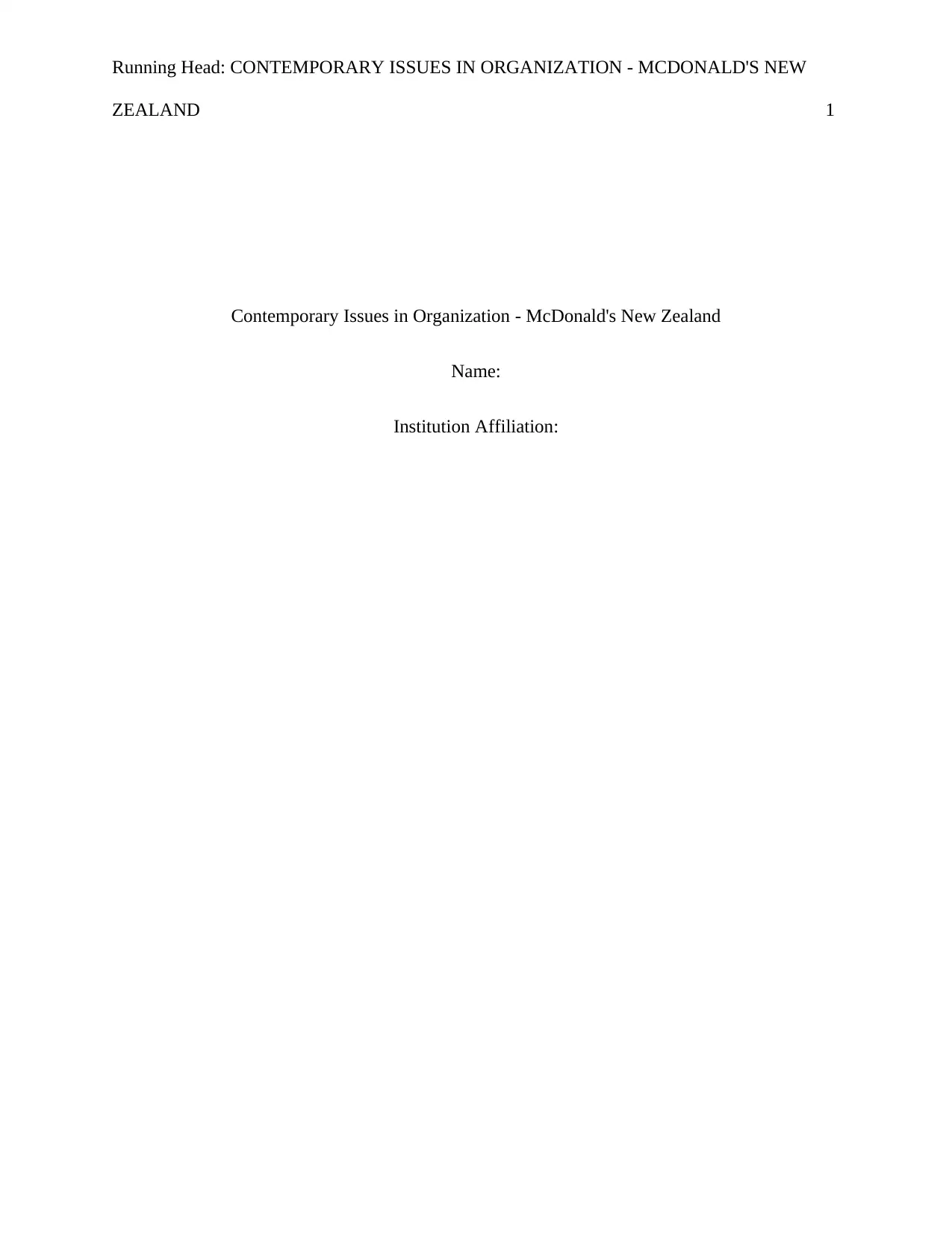
Running Head: CONTEMPORARY ISSUES IN ORGANIZATION - MCDONALD'S NEW
ZEALAND 1
Contemporary Issues in Organization - McDonald's New Zealand
Name:
Institution Affiliation:
ZEALAND 1
Contemporary Issues in Organization - McDonald's New Zealand
Name:
Institution Affiliation:
Paraphrase This Document
Need a fresh take? Get an instant paraphrase of this document with our AI Paraphraser
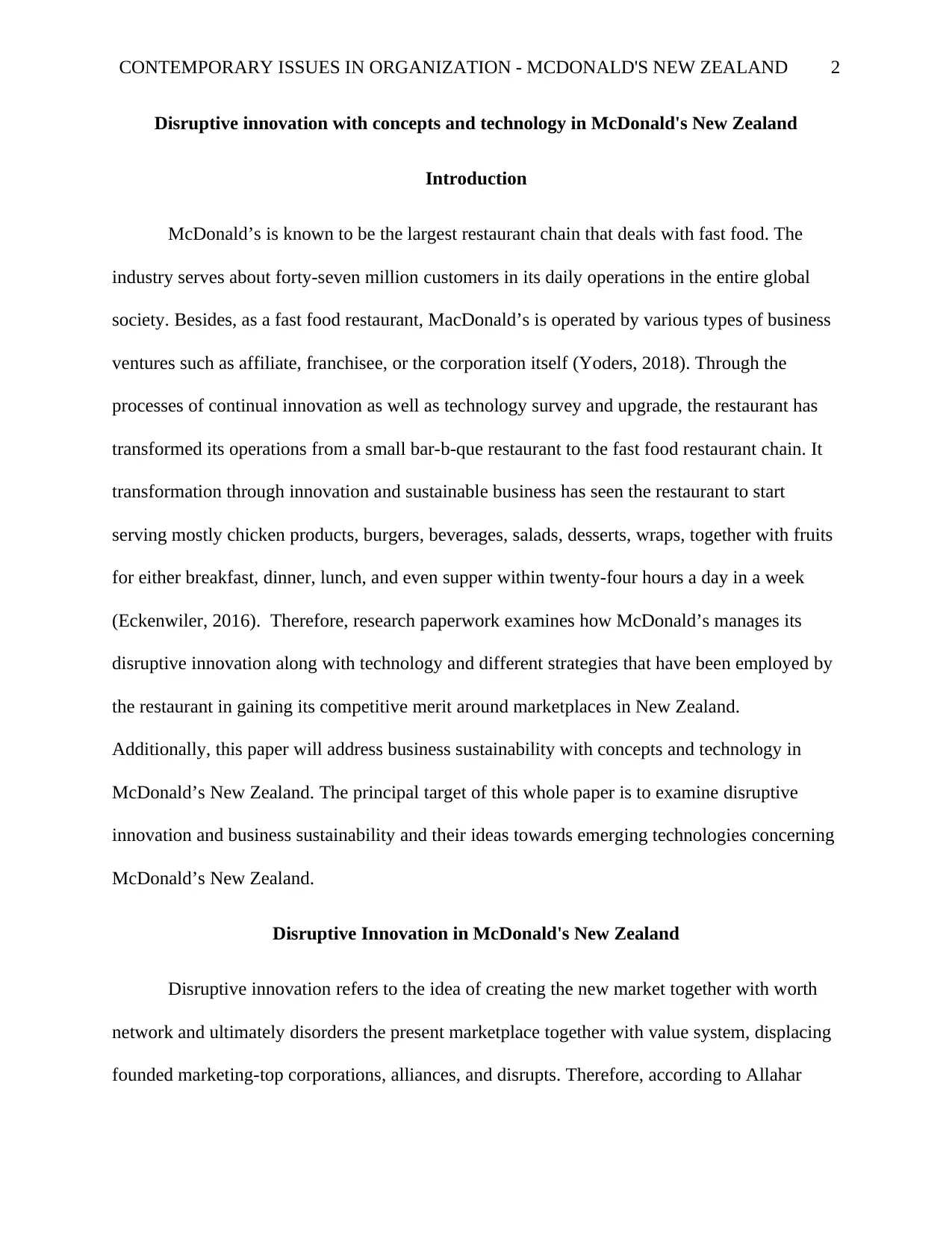
CONTEMPORARY ISSUES IN ORGANIZATION - MCDONALD'S NEW ZEALAND 2
Disruptive innovation with concepts and technology in McDonald's New Zealand
Introduction
McDonald’s is known to be the largest restaurant chain that deals with fast food. The
industry serves about forty-seven million customers in its daily operations in the entire global
society. Besides, as a fast food restaurant, MacDonald’s is operated by various types of business
ventures such as affiliate, franchisee, or the corporation itself (Yoders, 2018). Through the
processes of continual innovation as well as technology survey and upgrade, the restaurant has
transformed its operations from a small bar-b-que restaurant to the fast food restaurant chain. It
transformation through innovation and sustainable business has seen the restaurant to start
serving mostly chicken products, burgers, beverages, salads, desserts, wraps, together with fruits
for either breakfast, dinner, lunch, and even supper within twenty-four hours a day in a week
(Eckenwiler, 2016). Therefore, research paperwork examines how McDonald’s manages its
disruptive innovation along with technology and different strategies that have been employed by
the restaurant in gaining its competitive merit around marketplaces in New Zealand.
Additionally, this paper will address business sustainability with concepts and technology in
McDonald’s New Zealand. The principal target of this whole paper is to examine disruptive
innovation and business sustainability and their ideas towards emerging technologies concerning
McDonald’s New Zealand.
Disruptive Innovation in McDonald's New Zealand
Disruptive innovation refers to the idea of creating the new market together with worth
network and ultimately disorders the present marketplace together with value system, displacing
founded marketing-top corporations, alliances, and disrupts. Therefore, according to Allahar
Disruptive innovation with concepts and technology in McDonald's New Zealand
Introduction
McDonald’s is known to be the largest restaurant chain that deals with fast food. The
industry serves about forty-seven million customers in its daily operations in the entire global
society. Besides, as a fast food restaurant, MacDonald’s is operated by various types of business
ventures such as affiliate, franchisee, or the corporation itself (Yoders, 2018). Through the
processes of continual innovation as well as technology survey and upgrade, the restaurant has
transformed its operations from a small bar-b-que restaurant to the fast food restaurant chain. It
transformation through innovation and sustainable business has seen the restaurant to start
serving mostly chicken products, burgers, beverages, salads, desserts, wraps, together with fruits
for either breakfast, dinner, lunch, and even supper within twenty-four hours a day in a week
(Eckenwiler, 2016). Therefore, research paperwork examines how McDonald’s manages its
disruptive innovation along with technology and different strategies that have been employed by
the restaurant in gaining its competitive merit around marketplaces in New Zealand.
Additionally, this paper will address business sustainability with concepts and technology in
McDonald’s New Zealand. The principal target of this whole paper is to examine disruptive
innovation and business sustainability and their ideas towards emerging technologies concerning
McDonald’s New Zealand.
Disruptive Innovation in McDonald's New Zealand
Disruptive innovation refers to the idea of creating the new market together with worth
network and ultimately disorders the present marketplace together with value system, displacing
founded marketing-top corporations, alliances, and disrupts. Therefore, according to Allahar
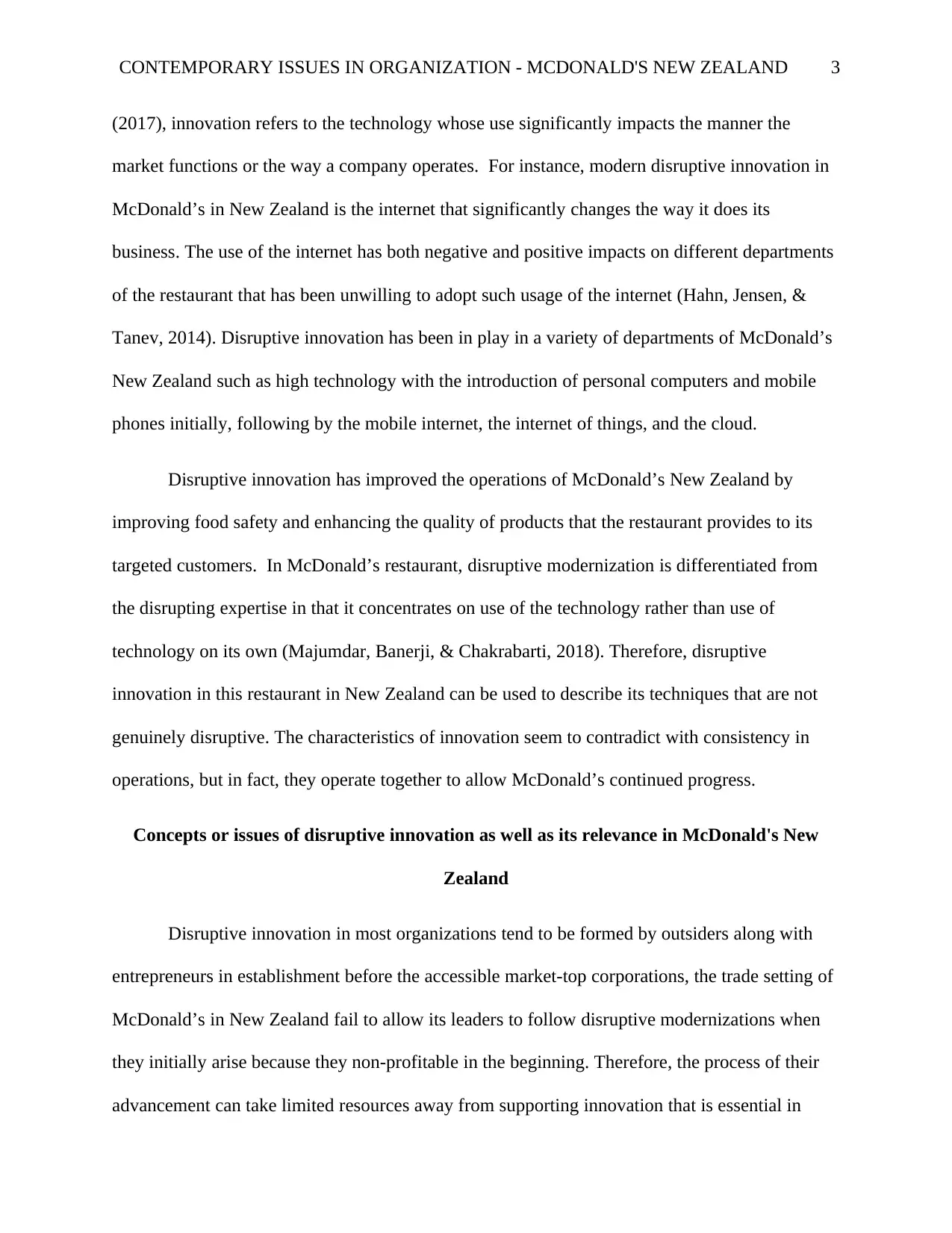
CONTEMPORARY ISSUES IN ORGANIZATION - MCDONALD'S NEW ZEALAND 3
(2017), innovation refers to the technology whose use significantly impacts the manner the
market functions or the way a company operates. For instance, modern disruptive innovation in
McDonald’s in New Zealand is the internet that significantly changes the way it does its
business. The use of the internet has both negative and positive impacts on different departments
of the restaurant that has been unwilling to adopt such usage of the internet (Hahn, Jensen, &
Tanev, 2014). Disruptive innovation has been in play in a variety of departments of McDonald’s
New Zealand such as high technology with the introduction of personal computers and mobile
phones initially, following by the mobile internet, the internet of things, and the cloud.
Disruptive innovation has improved the operations of McDonald’s New Zealand by
improving food safety and enhancing the quality of products that the restaurant provides to its
targeted customers. In McDonald’s restaurant, disruptive modernization is differentiated from
the disrupting expertise in that it concentrates on use of the technology rather than use of
technology on its own (Majumdar, Banerji, & Chakrabarti, 2018). Therefore, disruptive
innovation in this restaurant in New Zealand can be used to describe its techniques that are not
genuinely disruptive. The characteristics of innovation seem to contradict with consistency in
operations, but in fact, they operate together to allow McDonald’s continued progress.
Concepts or issues of disruptive innovation as well as its relevance in McDonald's New
Zealand
Disruptive innovation in most organizations tend to be formed by outsiders along with
entrepreneurs in establishment before the accessible market-top corporations, the trade setting of
McDonald’s in New Zealand fail to allow its leaders to follow disruptive modernizations when
they initially arise because they non-profitable in the beginning. Therefore, the process of their
advancement can take limited resources away from supporting innovation that is essential in
(2017), innovation refers to the technology whose use significantly impacts the manner the
market functions or the way a company operates. For instance, modern disruptive innovation in
McDonald’s in New Zealand is the internet that significantly changes the way it does its
business. The use of the internet has both negative and positive impacts on different departments
of the restaurant that has been unwilling to adopt such usage of the internet (Hahn, Jensen, &
Tanev, 2014). Disruptive innovation has been in play in a variety of departments of McDonald’s
New Zealand such as high technology with the introduction of personal computers and mobile
phones initially, following by the mobile internet, the internet of things, and the cloud.
Disruptive innovation has improved the operations of McDonald’s New Zealand by
improving food safety and enhancing the quality of products that the restaurant provides to its
targeted customers. In McDonald’s restaurant, disruptive modernization is differentiated from
the disrupting expertise in that it concentrates on use of the technology rather than use of
technology on its own (Majumdar, Banerji, & Chakrabarti, 2018). Therefore, disruptive
innovation in this restaurant in New Zealand can be used to describe its techniques that are not
genuinely disruptive. The characteristics of innovation seem to contradict with consistency in
operations, but in fact, they operate together to allow McDonald’s continued progress.
Concepts or issues of disruptive innovation as well as its relevance in McDonald's New
Zealand
Disruptive innovation in most organizations tend to be formed by outsiders along with
entrepreneurs in establishment before the accessible market-top corporations, the trade setting of
McDonald’s in New Zealand fail to allow its leaders to follow disruptive modernizations when
they initially arise because they non-profitable in the beginning. Therefore, the process of their
advancement can take limited resources away from supporting innovation that is essential in
⊘ This is a preview!⊘
Do you want full access?
Subscribe today to unlock all pages.

Trusted by 1+ million students worldwide
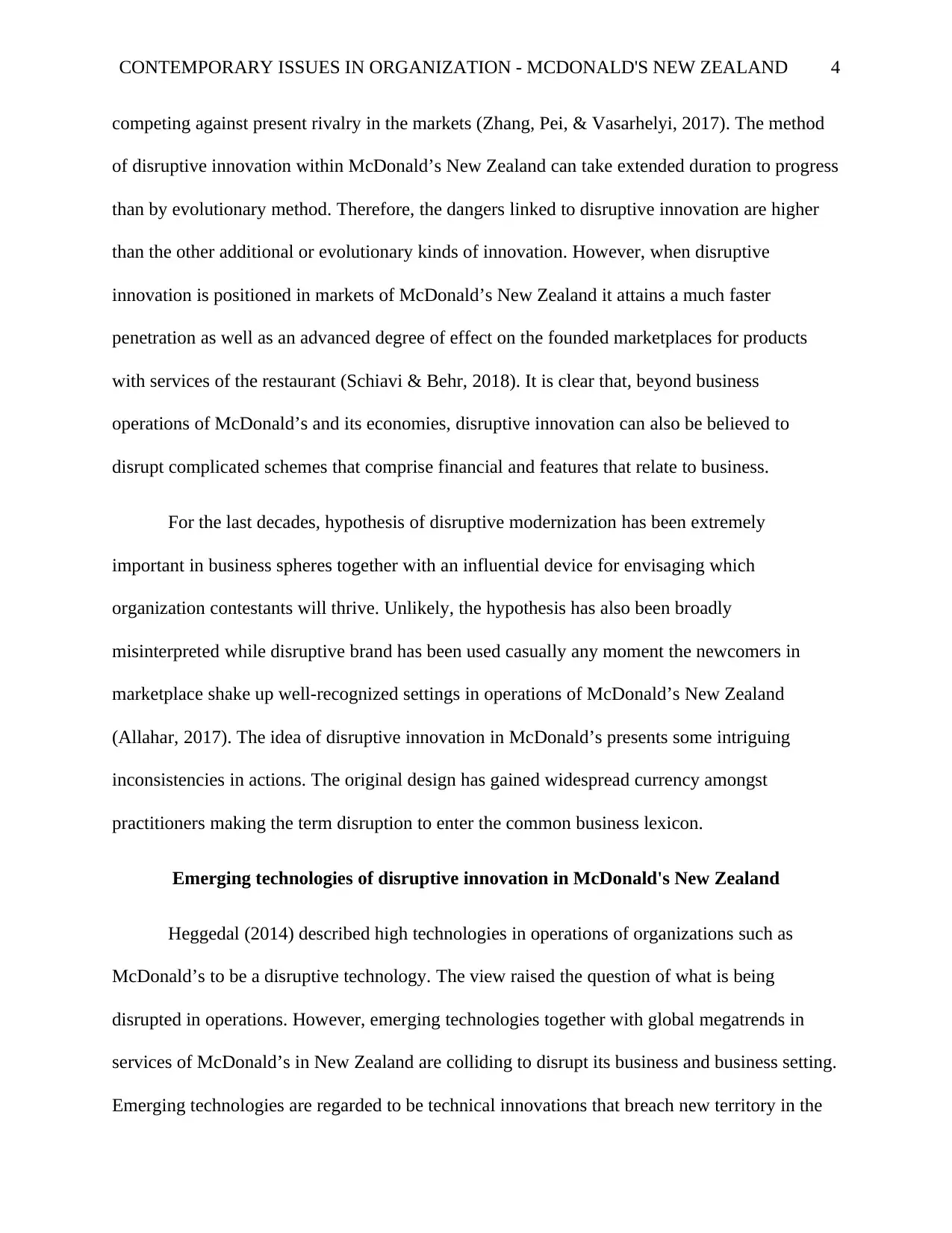
CONTEMPORARY ISSUES IN ORGANIZATION - MCDONALD'S NEW ZEALAND 4
competing against present rivalry in the markets (Zhang, Pei, & Vasarhelyi, 2017). The method
of disruptive innovation within McDonald’s New Zealand can take extended duration to progress
than by evolutionary method. Therefore, the dangers linked to disruptive innovation are higher
than the other additional or evolutionary kinds of innovation. However, when disruptive
innovation is positioned in markets of McDonald’s New Zealand it attains a much faster
penetration as well as an advanced degree of effect on the founded marketplaces for products
with services of the restaurant (Schiavi & Behr, 2018). It is clear that, beyond business
operations of McDonald’s and its economies, disruptive innovation can also be believed to
disrupt complicated schemes that comprise financial and features that relate to business.
For the last decades, hypothesis of disruptive modernization has been extremely
important in business spheres together with an influential device for envisaging which
organization contestants will thrive. Unlikely, the hypothesis has also been broadly
misinterpreted while disruptive brand has been used casually any moment the newcomers in
marketplace shake up well-recognized settings in operations of McDonald’s New Zealand
(Allahar, 2017). The idea of disruptive innovation in McDonald’s presents some intriguing
inconsistencies in actions. The original design has gained widespread currency amongst
practitioners making the term disruption to enter the common business lexicon.
Emerging technologies of disruptive innovation in McDonald's New Zealand
Heggedal (2014) described high technologies in operations of organizations such as
McDonald’s to be a disruptive technology. The view raised the question of what is being
disrupted in operations. However, emerging technologies together with global megatrends in
services of McDonald’s in New Zealand are colliding to disrupt its business and business setting.
Emerging technologies are regarded to be technical innovations that breach new territory in the
competing against present rivalry in the markets (Zhang, Pei, & Vasarhelyi, 2017). The method
of disruptive innovation within McDonald’s New Zealand can take extended duration to progress
than by evolutionary method. Therefore, the dangers linked to disruptive innovation are higher
than the other additional or evolutionary kinds of innovation. However, when disruptive
innovation is positioned in markets of McDonald’s New Zealand it attains a much faster
penetration as well as an advanced degree of effect on the founded marketplaces for products
with services of the restaurant (Schiavi & Behr, 2018). It is clear that, beyond business
operations of McDonald’s and its economies, disruptive innovation can also be believed to
disrupt complicated schemes that comprise financial and features that relate to business.
For the last decades, hypothesis of disruptive modernization has been extremely
important in business spheres together with an influential device for envisaging which
organization contestants will thrive. Unlikely, the hypothesis has also been broadly
misinterpreted while disruptive brand has been used casually any moment the newcomers in
marketplace shake up well-recognized settings in operations of McDonald’s New Zealand
(Allahar, 2017). The idea of disruptive innovation in McDonald’s presents some intriguing
inconsistencies in actions. The original design has gained widespread currency amongst
practitioners making the term disruption to enter the common business lexicon.
Emerging technologies of disruptive innovation in McDonald's New Zealand
Heggedal (2014) described high technologies in operations of organizations such as
McDonald’s to be a disruptive technology. The view raised the question of what is being
disrupted in operations. However, emerging technologies together with global megatrends in
services of McDonald’s in New Zealand are colliding to disrupt its business and business setting.
Emerging technologies are regarded to be technical innovations that breach new territory in the
Paraphrase This Document
Need a fresh take? Get an instant paraphrase of this document with our AI Paraphraser
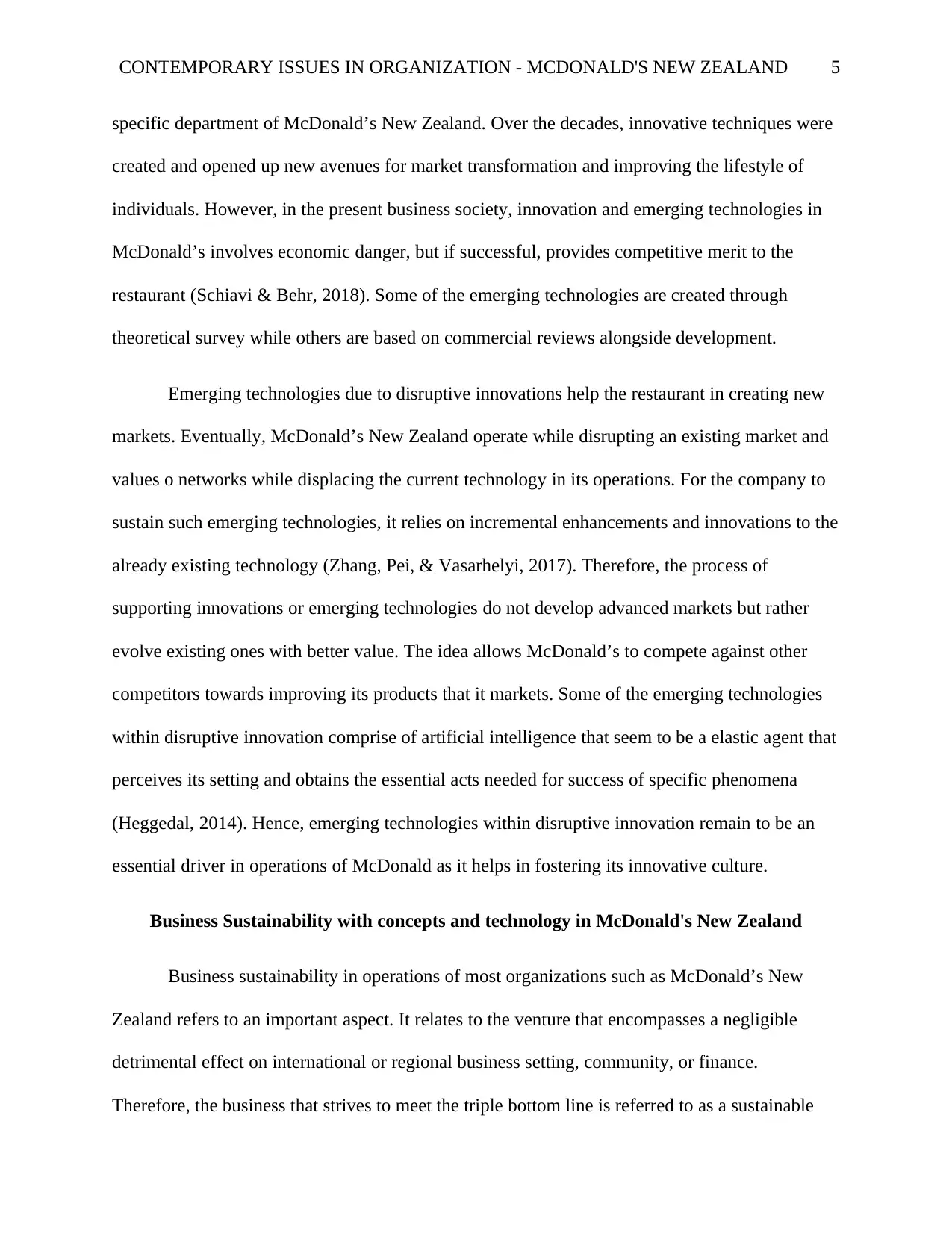
CONTEMPORARY ISSUES IN ORGANIZATION - MCDONALD'S NEW ZEALAND 5
specific department of McDonald’s New Zealand. Over the decades, innovative techniques were
created and opened up new avenues for market transformation and improving the lifestyle of
individuals. However, in the present business society, innovation and emerging technologies in
McDonald’s involves economic danger, but if successful, provides competitive merit to the
restaurant (Schiavi & Behr, 2018). Some of the emerging technologies are created through
theoretical survey while others are based on commercial reviews alongside development.
Emerging technologies due to disruptive innovations help the restaurant in creating new
markets. Eventually, McDonald’s New Zealand operate while disrupting an existing market and
values o networks while displacing the current technology in its operations. For the company to
sustain such emerging technologies, it relies on incremental enhancements and innovations to the
already existing technology (Zhang, Pei, & Vasarhelyi, 2017). Therefore, the process of
supporting innovations or emerging technologies do not develop advanced markets but rather
evolve existing ones with better value. The idea allows McDonald’s to compete against other
competitors towards improving its products that it markets. Some of the emerging technologies
within disruptive innovation comprise of artificial intelligence that seem to be a elastic agent that
perceives its setting and obtains the essential acts needed for success of specific phenomena
(Heggedal, 2014). Hence, emerging technologies within disruptive innovation remain to be an
essential driver in operations of McDonald as it helps in fostering its innovative culture.
Business Sustainability with concepts and technology in McDonald's New Zealand
Business sustainability in operations of most organizations such as McDonald’s New
Zealand refers to an important aspect. It relates to the venture that encompasses a negligible
detrimental effect on international or regional business setting, community, or finance.
Therefore, the business that strives to meet the triple bottom line is referred to as a sustainable
specific department of McDonald’s New Zealand. Over the decades, innovative techniques were
created and opened up new avenues for market transformation and improving the lifestyle of
individuals. However, in the present business society, innovation and emerging technologies in
McDonald’s involves economic danger, but if successful, provides competitive merit to the
restaurant (Schiavi & Behr, 2018). Some of the emerging technologies are created through
theoretical survey while others are based on commercial reviews alongside development.
Emerging technologies due to disruptive innovations help the restaurant in creating new
markets. Eventually, McDonald’s New Zealand operate while disrupting an existing market and
values o networks while displacing the current technology in its operations. For the company to
sustain such emerging technologies, it relies on incremental enhancements and innovations to the
already existing technology (Zhang, Pei, & Vasarhelyi, 2017). Therefore, the process of
supporting innovations or emerging technologies do not develop advanced markets but rather
evolve existing ones with better value. The idea allows McDonald’s to compete against other
competitors towards improving its products that it markets. Some of the emerging technologies
within disruptive innovation comprise of artificial intelligence that seem to be a elastic agent that
perceives its setting and obtains the essential acts needed for success of specific phenomena
(Heggedal, 2014). Hence, emerging technologies within disruptive innovation remain to be an
essential driver in operations of McDonald as it helps in fostering its innovative culture.
Business Sustainability with concepts and technology in McDonald's New Zealand
Business sustainability in operations of most organizations such as McDonald’s New
Zealand refers to an important aspect. It relates to the venture that encompasses a negligible
detrimental effect on international or regional business setting, community, or finance.
Therefore, the business that strives to meet the triple bottom line is referred to as a sustainable
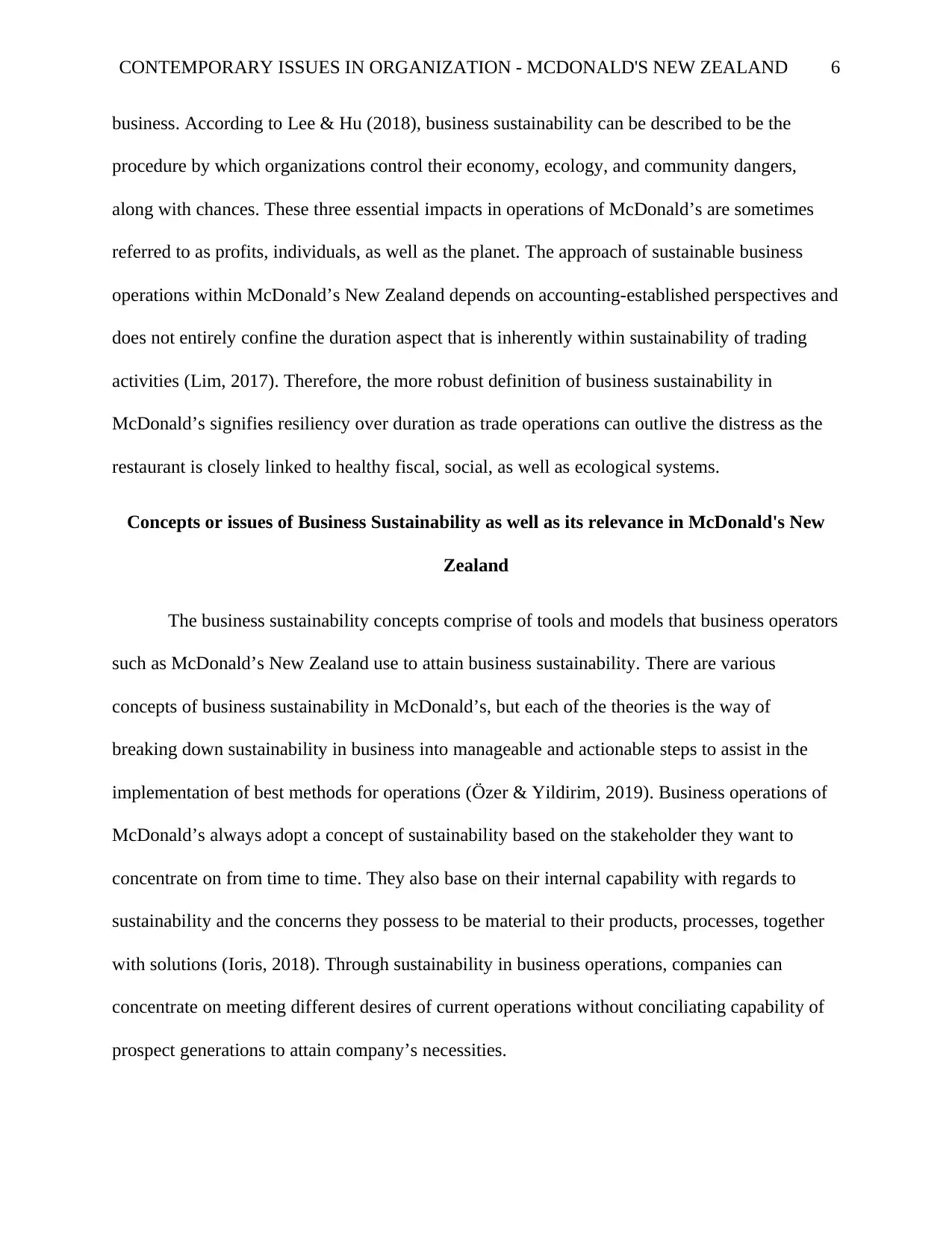
CONTEMPORARY ISSUES IN ORGANIZATION - MCDONALD'S NEW ZEALAND 6
business. According to Lee & Hu (2018), business sustainability can be described to be the
procedure by which organizations control their economy, ecology, and community dangers,
along with chances. These three essential impacts in operations of McDonald’s are sometimes
referred to as profits, individuals, as well as the planet. The approach of sustainable business
operations within McDonald’s New Zealand depends on accounting-established perspectives and
does not entirely confine the duration aspect that is inherently within sustainability of trading
activities (Lim, 2017). Therefore, the more robust definition of business sustainability in
McDonald’s signifies resiliency over duration as trade operations can outlive the distress as the
restaurant is closely linked to healthy fiscal, social, as well as ecological systems.
Concepts or issues of Business Sustainability as well as its relevance in McDonald's New
Zealand
The business sustainability concepts comprise of tools and models that business operators
such as McDonald’s New Zealand use to attain business sustainability. There are various
concepts of business sustainability in McDonald’s, but each of the theories is the way of
breaking down sustainability in business into manageable and actionable steps to assist in the
implementation of best methods for operations (Özer & Yildirim, 2019). Business operations of
McDonald’s always adopt a concept of sustainability based on the stakeholder they want to
concentrate on from time to time. They also base on their internal capability with regards to
sustainability and the concerns they possess to be material to their products, processes, together
with solutions (Ioris, 2018). Through sustainability in business operations, companies can
concentrate on meeting different desires of current operations without conciliating capability of
prospect generations to attain company’s necessities.
business. According to Lee & Hu (2018), business sustainability can be described to be the
procedure by which organizations control their economy, ecology, and community dangers,
along with chances. These three essential impacts in operations of McDonald’s are sometimes
referred to as profits, individuals, as well as the planet. The approach of sustainable business
operations within McDonald’s New Zealand depends on accounting-established perspectives and
does not entirely confine the duration aspect that is inherently within sustainability of trading
activities (Lim, 2017). Therefore, the more robust definition of business sustainability in
McDonald’s signifies resiliency over duration as trade operations can outlive the distress as the
restaurant is closely linked to healthy fiscal, social, as well as ecological systems.
Concepts or issues of Business Sustainability as well as its relevance in McDonald's New
Zealand
The business sustainability concepts comprise of tools and models that business operators
such as McDonald’s New Zealand use to attain business sustainability. There are various
concepts of business sustainability in McDonald’s, but each of the theories is the way of
breaking down sustainability in business into manageable and actionable steps to assist in the
implementation of best methods for operations (Özer & Yildirim, 2019). Business operations of
McDonald’s always adopt a concept of sustainability based on the stakeholder they want to
concentrate on from time to time. They also base on their internal capability with regards to
sustainability and the concerns they possess to be material to their products, processes, together
with solutions (Ioris, 2018). Through sustainability in business operations, companies can
concentrate on meeting different desires of current operations without conciliating capability of
prospect generations to attain company’s necessities.
⊘ This is a preview!⊘
Do you want full access?
Subscribe today to unlock all pages.

Trusted by 1+ million students worldwide
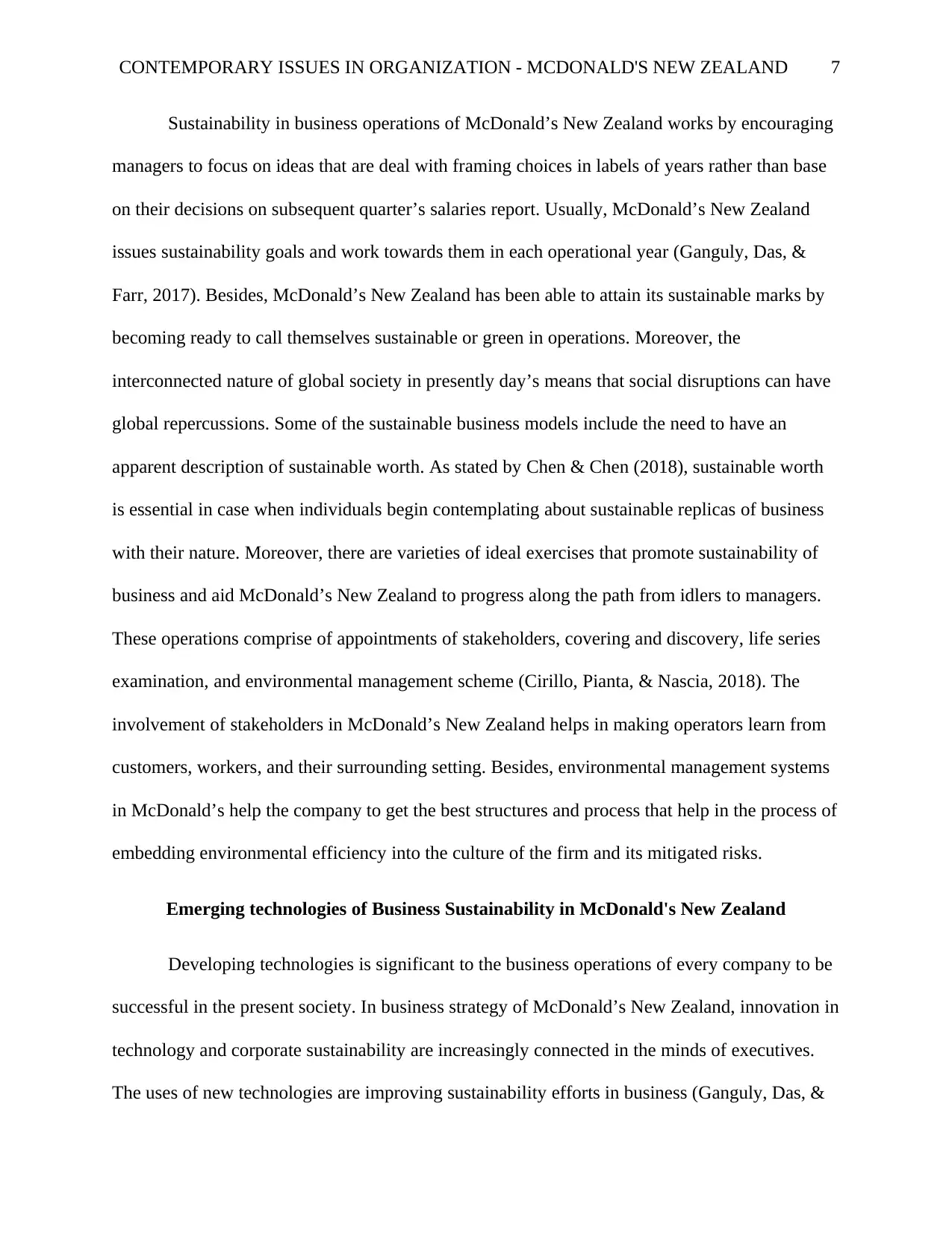
CONTEMPORARY ISSUES IN ORGANIZATION - MCDONALD'S NEW ZEALAND 7
Sustainability in business operations of McDonald’s New Zealand works by encouraging
managers to focus on ideas that are deal with framing choices in labels of years rather than base
on their decisions on subsequent quarter’s salaries report. Usually, McDonald’s New Zealand
issues sustainability goals and work towards them in each operational year (Ganguly, Das, &
Farr, 2017). Besides, McDonald’s New Zealand has been able to attain its sustainable marks by
becoming ready to call themselves sustainable or green in operations. Moreover, the
interconnected nature of global society in presently day’s means that social disruptions can have
global repercussions. Some of the sustainable business models include the need to have an
apparent description of sustainable worth. As stated by Chen & Chen (2018), sustainable worth
is essential in case when individuals begin contemplating about sustainable replicas of business
with their nature. Moreover, there are varieties of ideal exercises that promote sustainability of
business and aid McDonald’s New Zealand to progress along the path from idlers to managers.
These operations comprise of appointments of stakeholders, covering and discovery, life series
examination, and environmental management scheme (Cirillo, Pianta, & Nascia, 2018). The
involvement of stakeholders in McDonald’s New Zealand helps in making operators learn from
customers, workers, and their surrounding setting. Besides, environmental management systems
in McDonald’s help the company to get the best structures and process that help in the process of
embedding environmental efficiency into the culture of the firm and its mitigated risks.
Emerging technologies of Business Sustainability in McDonald's New Zealand
Developing technologies is significant to the business operations of every company to be
successful in the present society. In business strategy of McDonald’s New Zealand, innovation in
technology and corporate sustainability are increasingly connected in the minds of executives.
The uses of new technologies are improving sustainability efforts in business (Ganguly, Das, &
Sustainability in business operations of McDonald’s New Zealand works by encouraging
managers to focus on ideas that are deal with framing choices in labels of years rather than base
on their decisions on subsequent quarter’s salaries report. Usually, McDonald’s New Zealand
issues sustainability goals and work towards them in each operational year (Ganguly, Das, &
Farr, 2017). Besides, McDonald’s New Zealand has been able to attain its sustainable marks by
becoming ready to call themselves sustainable or green in operations. Moreover, the
interconnected nature of global society in presently day’s means that social disruptions can have
global repercussions. Some of the sustainable business models include the need to have an
apparent description of sustainable worth. As stated by Chen & Chen (2018), sustainable worth
is essential in case when individuals begin contemplating about sustainable replicas of business
with their nature. Moreover, there are varieties of ideal exercises that promote sustainability of
business and aid McDonald’s New Zealand to progress along the path from idlers to managers.
These operations comprise of appointments of stakeholders, covering and discovery, life series
examination, and environmental management scheme (Cirillo, Pianta, & Nascia, 2018). The
involvement of stakeholders in McDonald’s New Zealand helps in making operators learn from
customers, workers, and their surrounding setting. Besides, environmental management systems
in McDonald’s help the company to get the best structures and process that help in the process of
embedding environmental efficiency into the culture of the firm and its mitigated risks.
Emerging technologies of Business Sustainability in McDonald's New Zealand
Developing technologies is significant to the business operations of every company to be
successful in the present society. In business strategy of McDonald’s New Zealand, innovation in
technology and corporate sustainability are increasingly connected in the minds of executives.
The uses of new technologies are improving sustainability efforts in business (Ganguly, Das, &
Paraphrase This Document
Need a fresh take? Get an instant paraphrase of this document with our AI Paraphraser
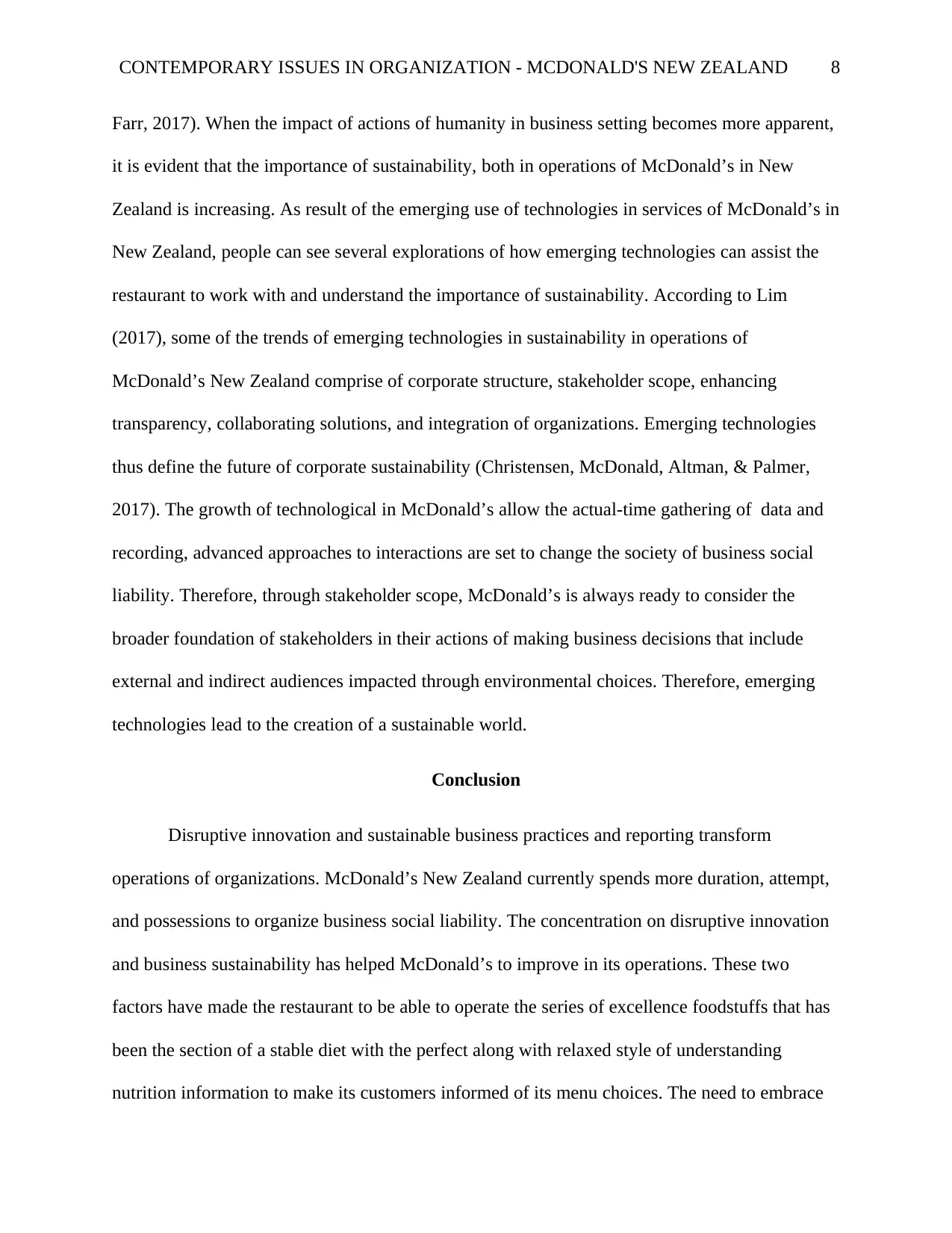
CONTEMPORARY ISSUES IN ORGANIZATION - MCDONALD'S NEW ZEALAND 8
Farr, 2017). When the impact of actions of humanity in business setting becomes more apparent,
it is evident that the importance of sustainability, both in operations of McDonald’s in New
Zealand is increasing. As result of the emerging use of technologies in services of McDonald’s in
New Zealand, people can see several explorations of how emerging technologies can assist the
restaurant to work with and understand the importance of sustainability. According to Lim
(2017), some of the trends of emerging technologies in sustainability in operations of
McDonald’s New Zealand comprise of corporate structure, stakeholder scope, enhancing
transparency, collaborating solutions, and integration of organizations. Emerging technologies
thus define the future of corporate sustainability (Christensen, McDonald, Altman, & Palmer,
2017). The growth of technological in McDonald’s allow the actual-time gathering of data and
recording, advanced approaches to interactions are set to change the society of business social
liability. Therefore, through stakeholder scope, McDonald’s is always ready to consider the
broader foundation of stakeholders in their actions of making business decisions that include
external and indirect audiences impacted through environmental choices. Therefore, emerging
technologies lead to the creation of a sustainable world.
Conclusion
Disruptive innovation and sustainable business practices and reporting transform
operations of organizations. McDonald’s New Zealand currently spends more duration, attempt,
and possessions to organize business social liability. The concentration on disruptive innovation
and business sustainability has helped McDonald’s to improve in its operations. These two
factors have made the restaurant to be able to operate the series of excellence foodstuffs that has
been the section of a stable diet with the perfect along with relaxed style of understanding
nutrition information to make its customers informed of its menu choices. The need to embrace
Farr, 2017). When the impact of actions of humanity in business setting becomes more apparent,
it is evident that the importance of sustainability, both in operations of McDonald’s in New
Zealand is increasing. As result of the emerging use of technologies in services of McDonald’s in
New Zealand, people can see several explorations of how emerging technologies can assist the
restaurant to work with and understand the importance of sustainability. According to Lim
(2017), some of the trends of emerging technologies in sustainability in operations of
McDonald’s New Zealand comprise of corporate structure, stakeholder scope, enhancing
transparency, collaborating solutions, and integration of organizations. Emerging technologies
thus define the future of corporate sustainability (Christensen, McDonald, Altman, & Palmer,
2017). The growth of technological in McDonald’s allow the actual-time gathering of data and
recording, advanced approaches to interactions are set to change the society of business social
liability. Therefore, through stakeholder scope, McDonald’s is always ready to consider the
broader foundation of stakeholders in their actions of making business decisions that include
external and indirect audiences impacted through environmental choices. Therefore, emerging
technologies lead to the creation of a sustainable world.
Conclusion
Disruptive innovation and sustainable business practices and reporting transform
operations of organizations. McDonald’s New Zealand currently spends more duration, attempt,
and possessions to organize business social liability. The concentration on disruptive innovation
and business sustainability has helped McDonald’s to improve in its operations. These two
factors have made the restaurant to be able to operate the series of excellence foodstuffs that has
been the section of a stable diet with the perfect along with relaxed style of understanding
nutrition information to make its customers informed of its menu choices. The need to embrace
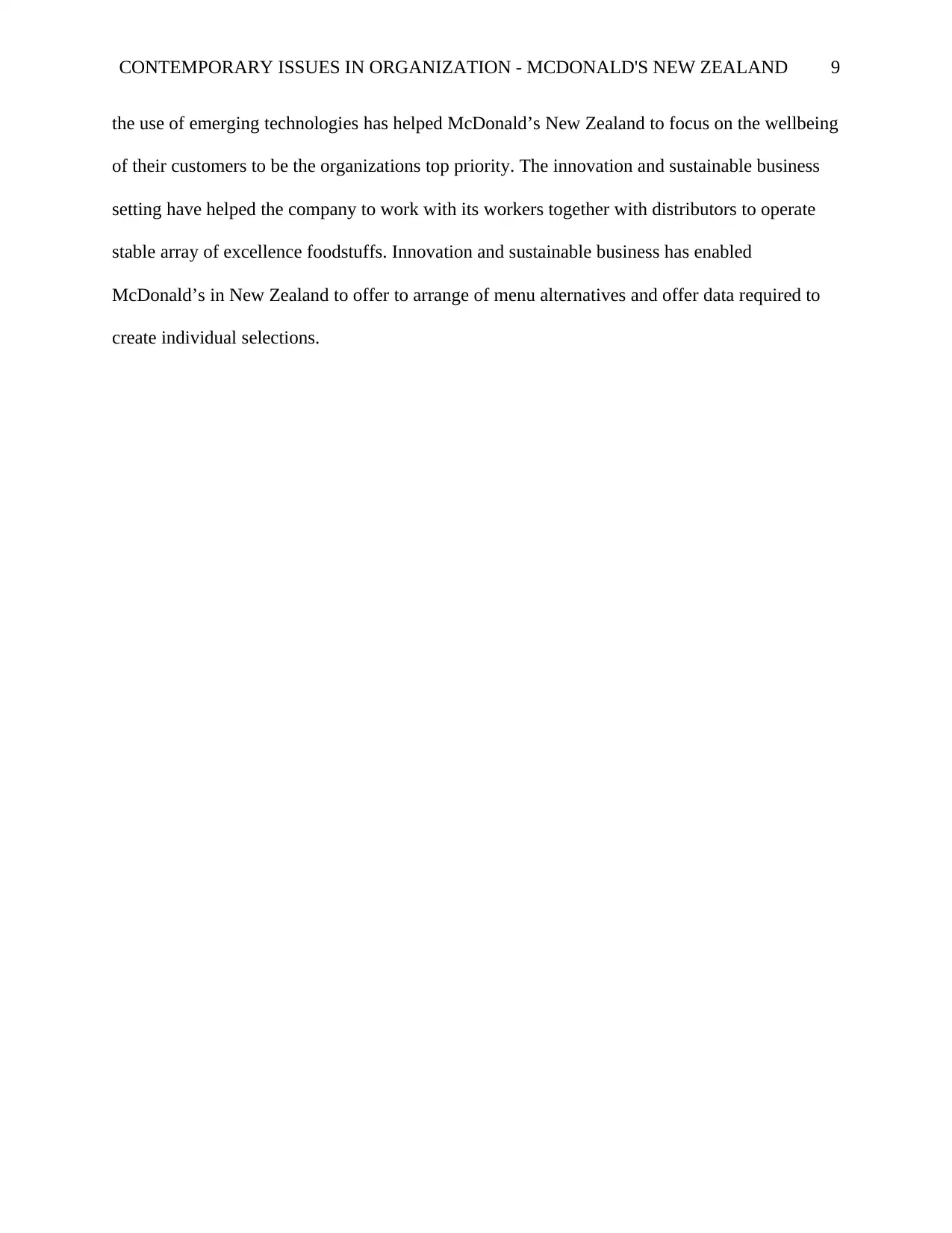
CONTEMPORARY ISSUES IN ORGANIZATION - MCDONALD'S NEW ZEALAND 9
the use of emerging technologies has helped McDonald’s New Zealand to focus on the wellbeing
of their customers to be the organizations top priority. The innovation and sustainable business
setting have helped the company to work with its workers together with distributors to operate
stable array of excellence foodstuffs. Innovation and sustainable business has enabled
McDonald’s in New Zealand to offer to arrange of menu alternatives and offer data required to
create individual selections.
the use of emerging technologies has helped McDonald’s New Zealand to focus on the wellbeing
of their customers to be the organizations top priority. The innovation and sustainable business
setting have helped the company to work with its workers together with distributors to operate
stable array of excellence foodstuffs. Innovation and sustainable business has enabled
McDonald’s in New Zealand to offer to arrange of menu alternatives and offer data required to
create individual selections.
⊘ This is a preview!⊘
Do you want full access?
Subscribe today to unlock all pages.

Trusted by 1+ million students worldwide
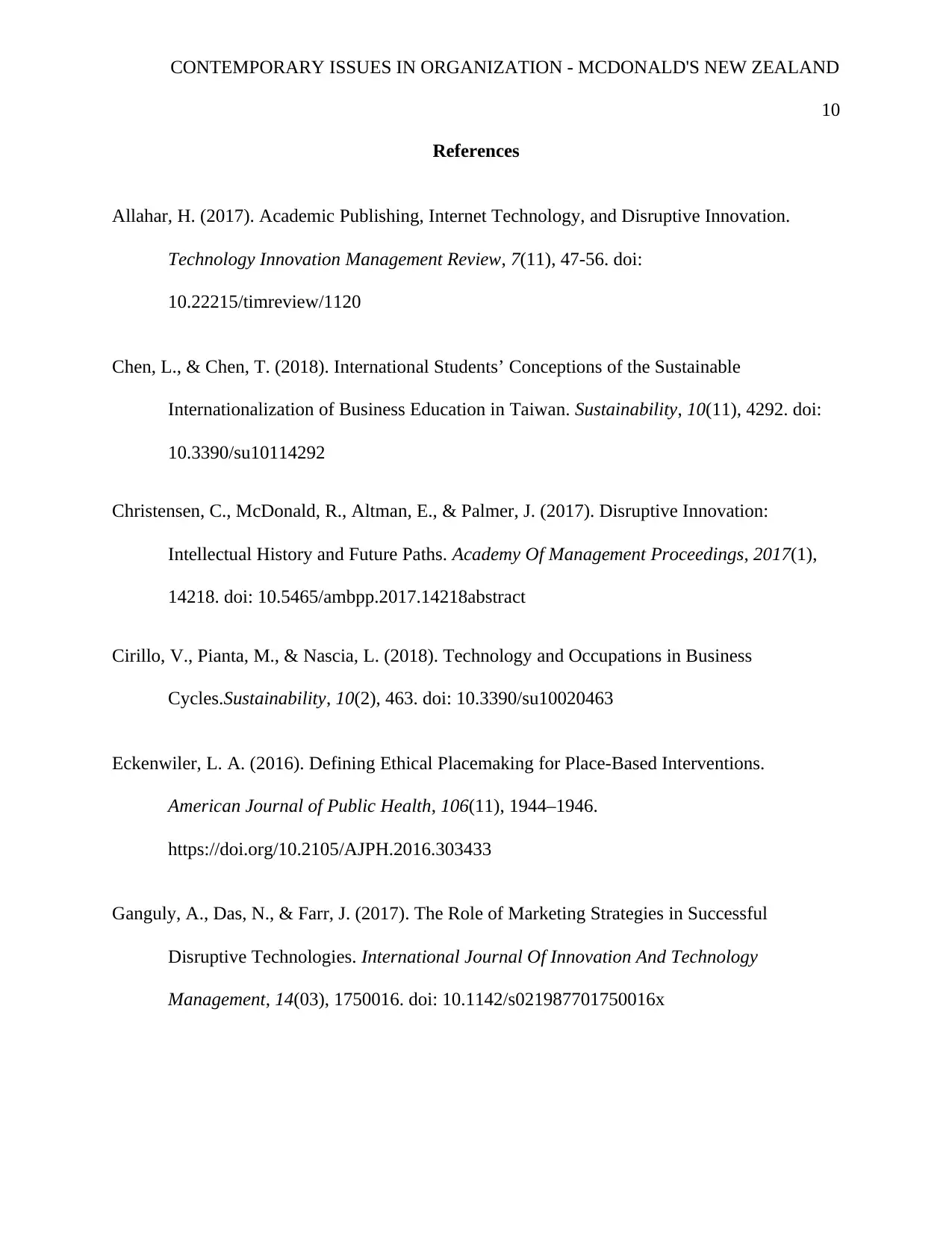
CONTEMPORARY ISSUES IN ORGANIZATION - MCDONALD'S NEW ZEALAND
10
References
Allahar, H. (2017). Academic Publishing, Internet Technology, and Disruptive Innovation.
Technology Innovation Management Review, 7(11), 47-56. doi:
10.22215/timreview/1120
Chen, L., & Chen, T. (2018). International Students’ Conceptions of the Sustainable
Internationalization of Business Education in Taiwan. Sustainability, 10(11), 4292. doi:
10.3390/su10114292
Christensen, C., McDonald, R., Altman, E., & Palmer, J. (2017). Disruptive Innovation:
Intellectual History and Future Paths. Academy Of Management Proceedings, 2017(1),
14218. doi: 10.5465/ambpp.2017.14218abstract
Cirillo, V., Pianta, M., & Nascia, L. (2018). Technology and Occupations in Business
Cycles.Sustainability, 10(2), 463. doi: 10.3390/su10020463
Eckenwiler, L. A. (2016). Defining Ethical Placemaking for Place-Based Interventions.
American Journal of Public Health, 106(11), 1944–1946.
https://doi.org/10.2105/AJPH.2016.303433
Ganguly, A., Das, N., & Farr, J. (2017). The Role of Marketing Strategies in Successful
Disruptive Technologies. International Journal Of Innovation And Technology
Management, 14(03), 1750016. doi: 10.1142/s021987701750016x
10
References
Allahar, H. (2017). Academic Publishing, Internet Technology, and Disruptive Innovation.
Technology Innovation Management Review, 7(11), 47-56. doi:
10.22215/timreview/1120
Chen, L., & Chen, T. (2018). International Students’ Conceptions of the Sustainable
Internationalization of Business Education in Taiwan. Sustainability, 10(11), 4292. doi:
10.3390/su10114292
Christensen, C., McDonald, R., Altman, E., & Palmer, J. (2017). Disruptive Innovation:
Intellectual History and Future Paths. Academy Of Management Proceedings, 2017(1),
14218. doi: 10.5465/ambpp.2017.14218abstract
Cirillo, V., Pianta, M., & Nascia, L. (2018). Technology and Occupations in Business
Cycles.Sustainability, 10(2), 463. doi: 10.3390/su10020463
Eckenwiler, L. A. (2016). Defining Ethical Placemaking for Place-Based Interventions.
American Journal of Public Health, 106(11), 1944–1946.
https://doi.org/10.2105/AJPH.2016.303433
Ganguly, A., Das, N., & Farr, J. (2017). The Role of Marketing Strategies in Successful
Disruptive Technologies. International Journal Of Innovation And Technology
Management, 14(03), 1750016. doi: 10.1142/s021987701750016x
Paraphrase This Document
Need a fresh take? Get an instant paraphrase of this document with our AI Paraphraser
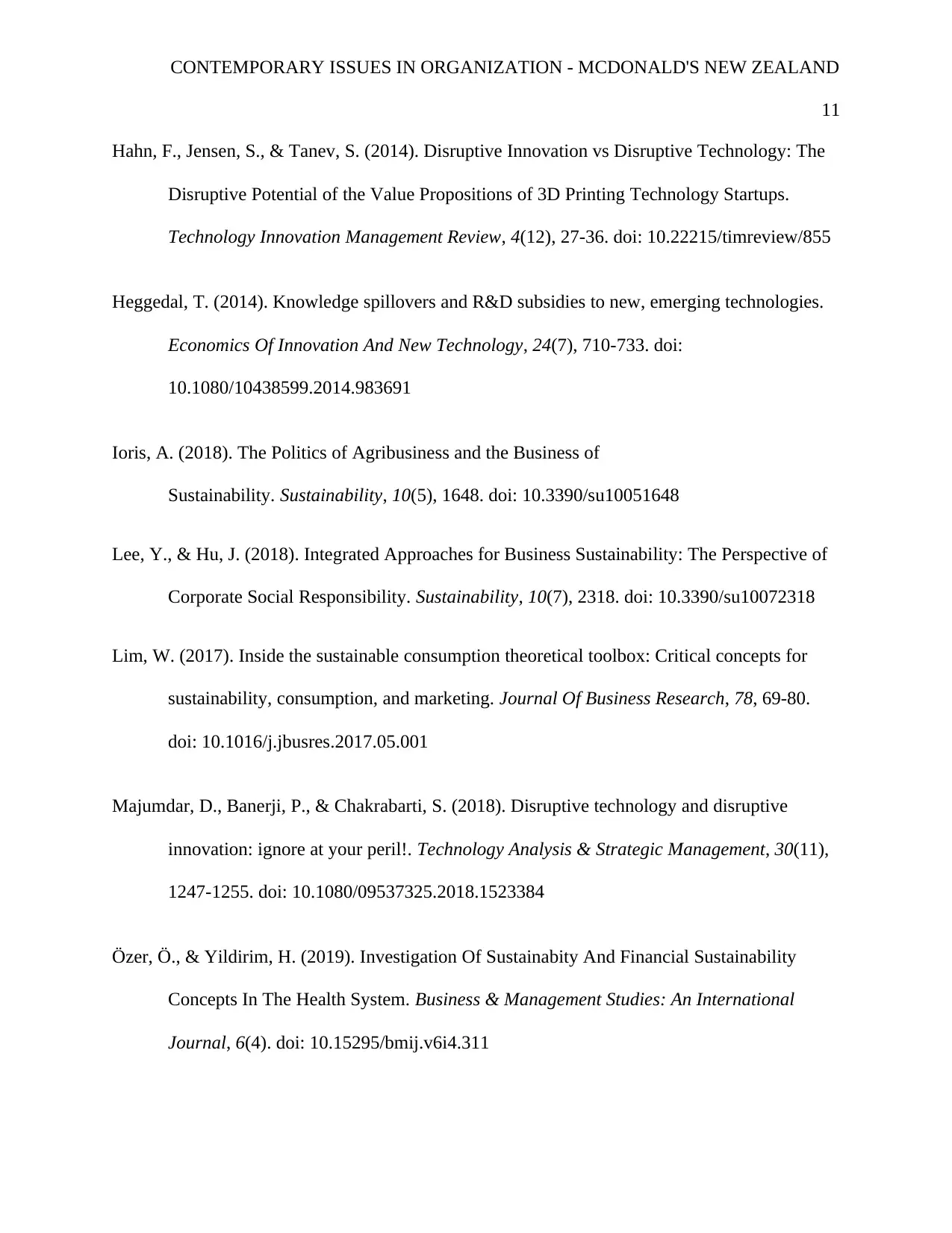
CONTEMPORARY ISSUES IN ORGANIZATION - MCDONALD'S NEW ZEALAND
11
Hahn, F., Jensen, S., & Tanev, S. (2014). Disruptive Innovation vs Disruptive Technology: The
Disruptive Potential of the Value Propositions of 3D Printing Technology Startups.
Technology Innovation Management Review, 4(12), 27-36. doi: 10.22215/timreview/855
Heggedal, T. (2014). Knowledge spillovers and R&D subsidies to new, emerging technologies.
Economics Of Innovation And New Technology, 24(7), 710-733. doi:
10.1080/10438599.2014.983691
Ioris, A. (2018). The Politics of Agribusiness and the Business of
Sustainability. Sustainability, 10(5), 1648. doi: 10.3390/su10051648
Lee, Y., & Hu, J. (2018). Integrated Approaches for Business Sustainability: The Perspective of
Corporate Social Responsibility. Sustainability, 10(7), 2318. doi: 10.3390/su10072318
Lim, W. (2017). Inside the sustainable consumption theoretical toolbox: Critical concepts for
sustainability, consumption, and marketing. Journal Of Business Research, 78, 69-80.
doi: 10.1016/j.jbusres.2017.05.001
Majumdar, D., Banerji, P., & Chakrabarti, S. (2018). Disruptive technology and disruptive
innovation: ignore at your peril!. Technology Analysis & Strategic Management, 30(11),
1247-1255. doi: 10.1080/09537325.2018.1523384
Özer, Ö., & Yildirim, H. (2019). Investigation Of Sustainabity And Financial Sustainability
Concepts In The Health System. Business & Management Studies: An International
Journal, 6(4). doi: 10.15295/bmij.v6i4.311
11
Hahn, F., Jensen, S., & Tanev, S. (2014). Disruptive Innovation vs Disruptive Technology: The
Disruptive Potential of the Value Propositions of 3D Printing Technology Startups.
Technology Innovation Management Review, 4(12), 27-36. doi: 10.22215/timreview/855
Heggedal, T. (2014). Knowledge spillovers and R&D subsidies to new, emerging technologies.
Economics Of Innovation And New Technology, 24(7), 710-733. doi:
10.1080/10438599.2014.983691
Ioris, A. (2018). The Politics of Agribusiness and the Business of
Sustainability. Sustainability, 10(5), 1648. doi: 10.3390/su10051648
Lee, Y., & Hu, J. (2018). Integrated Approaches for Business Sustainability: The Perspective of
Corporate Social Responsibility. Sustainability, 10(7), 2318. doi: 10.3390/su10072318
Lim, W. (2017). Inside the sustainable consumption theoretical toolbox: Critical concepts for
sustainability, consumption, and marketing. Journal Of Business Research, 78, 69-80.
doi: 10.1016/j.jbusres.2017.05.001
Majumdar, D., Banerji, P., & Chakrabarti, S. (2018). Disruptive technology and disruptive
innovation: ignore at your peril!. Technology Analysis & Strategic Management, 30(11),
1247-1255. doi: 10.1080/09537325.2018.1523384
Özer, Ö., & Yildirim, H. (2019). Investigation Of Sustainabity And Financial Sustainability
Concepts In The Health System. Business & Management Studies: An International
Journal, 6(4). doi: 10.15295/bmij.v6i4.311
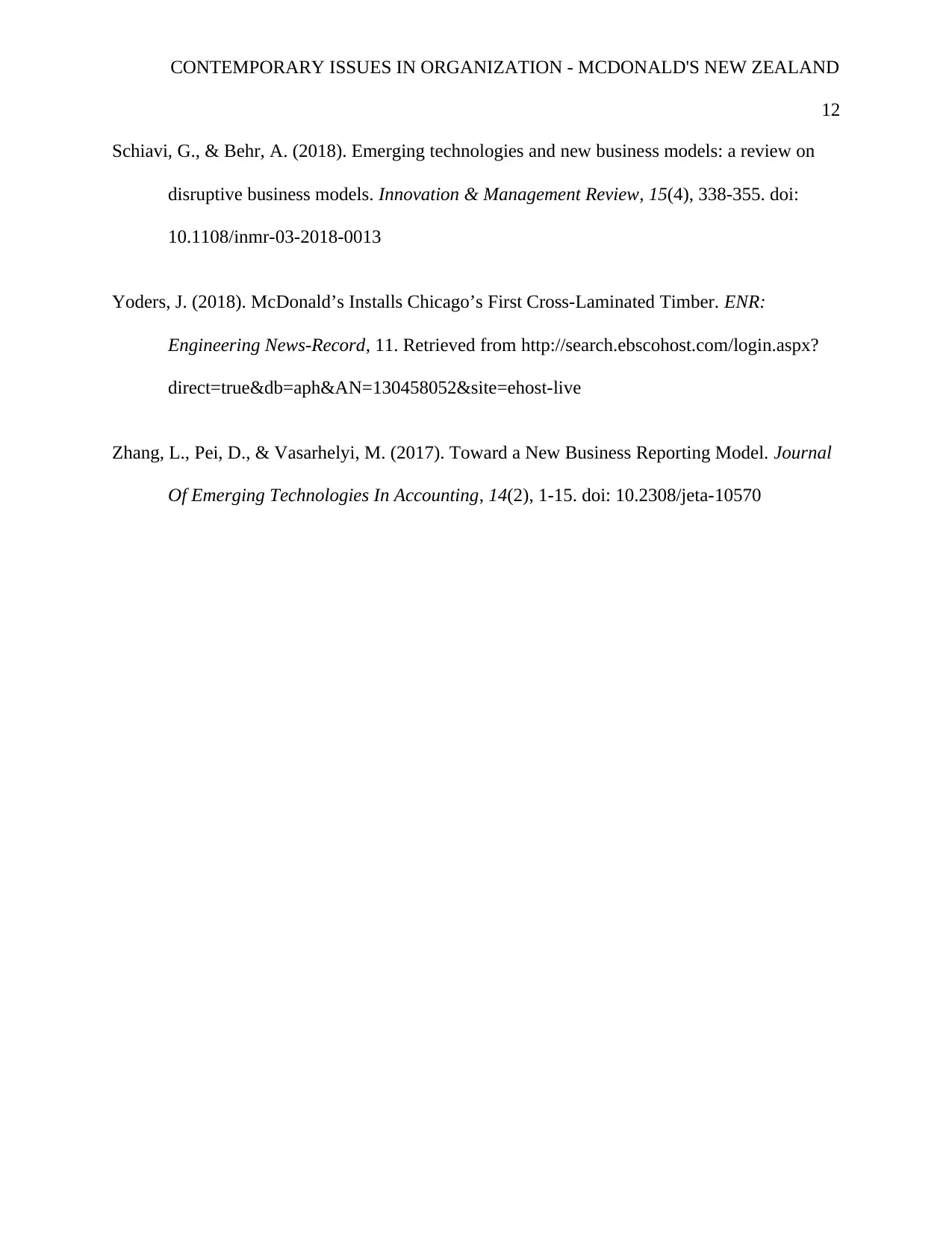
CONTEMPORARY ISSUES IN ORGANIZATION - MCDONALD'S NEW ZEALAND
12
Schiavi, G., & Behr, A. (2018). Emerging technologies and new business models: a review on
disruptive business models. Innovation & Management Review, 15(4), 338-355. doi:
10.1108/inmr-03-2018-0013
Yoders, J. (2018). McDonald’s Installs Chicago’s First Cross-Laminated Timber. ENR:
Engineering News-Record, 11. Retrieved from http://search.ebscohost.com/login.aspx?
direct=true&db=aph&AN=130458052&site=ehost-live
Zhang, L., Pei, D., & Vasarhelyi, M. (2017). Toward a New Business Reporting Model. Journal
Of Emerging Technologies In Accounting, 14(2), 1-15. doi: 10.2308/jeta-10570
12
Schiavi, G., & Behr, A. (2018). Emerging technologies and new business models: a review on
disruptive business models. Innovation & Management Review, 15(4), 338-355. doi:
10.1108/inmr-03-2018-0013
Yoders, J. (2018). McDonald’s Installs Chicago’s First Cross-Laminated Timber. ENR:
Engineering News-Record, 11. Retrieved from http://search.ebscohost.com/login.aspx?
direct=true&db=aph&AN=130458052&site=ehost-live
Zhang, L., Pei, D., & Vasarhelyi, M. (2017). Toward a New Business Reporting Model. Journal
Of Emerging Technologies In Accounting, 14(2), 1-15. doi: 10.2308/jeta-10570
⊘ This is a preview!⊘
Do you want full access?
Subscribe today to unlock all pages.

Trusted by 1+ million students worldwide
1 out of 12
Related Documents
Your All-in-One AI-Powered Toolkit for Academic Success.
+13062052269
info@desklib.com
Available 24*7 on WhatsApp / Email
![[object Object]](/_next/static/media/star-bottom.7253800d.svg)
Unlock your academic potential
Copyright © 2020–2026 A2Z Services. All Rights Reserved. Developed and managed by ZUCOL.




